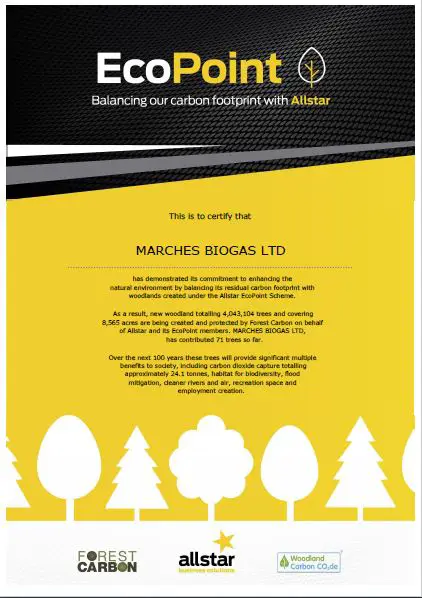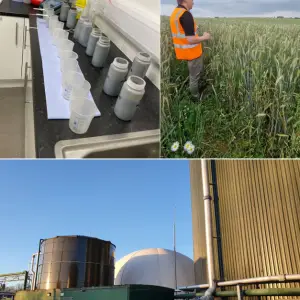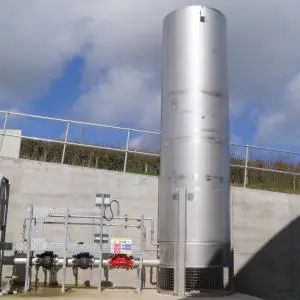Environmental News 2/3/2021
Environmental News 2/3/2021

We thought it would be useful to communicate some elements of the business we have been working on to reduce our environmental impact, as well as highlight some regulatory changes that are being made within the AD industry.
Marches Biogas
Marches Biogas is continually working on the sustainability of the business and we are conscious of the business’s environmental impacts. That’s why we are proud to announce that as part of the EcoPoint and Allstars carbon offset program we have helped to enhance the natural environmental by balancing our residual carbon footprint. Through the program new woodland is being planted creating so many vital benefits to the environment and society.
We have also been working towards achieving ISO 14001 and ISO 9001 accreditation by May this year. Achieving ISO accreditation will demonstrate Marches Biogas Quality Management Principles and Environmental Management Systems and will ensure we have a process to continually evaluate and improve our systems.
EA Permitting
While we have been busy working on our own environmental compliance there has also been a lot of activity going on within the industry. As some of you may be aware the Environment Agency (EA) have published its response to the revision of the standard rule permits for biowaste treatment consultation. The revised standard rules permit will be published in due course and the EA will contact all permit holders to inform them of the changes. Sites will have three months to comply with the rule sets although a longer transition period will be given for some cases.
Some of the key areas of changes which have been highlighted are:
- The number of standard rule permits has reduced.
- Existing sites will require a chartered civil or chartered engineer to do a risk-based assessment of the infrastructure, secondary containment and drainage systems. Construction Industry Research and Information Association (CIRIA) standards will be adopted for secondary containment. This will also include providing an accurate drainage plan and how the operator will prevent the risk of polluting material leaving the site. Where CIRIA standards cannot be met it may be acceptable for the operator to demonstrate using an alternative standard, that meets the same or a better standard.
- Sites Environment Management System (EMS) must include a robust emergency accident plan.
- The EA will require new sites to validate and sign off all containment by a chartered civil or structural engineer before operations start.
- There will be a condition within the standard rules permit that requires limiting volumes to operational capacity. Operators must also have a contingency plan in place for when the landbank is not available and there will be a minimum on-site storage time of 2 months. However, this does not apply to waste water sludge permits.
- Most of the '99' waste codes have been removed and replaced. Some waste codes have been added to the composting permits and will allow the recovery of digestate fibre.
- There is a staged approach to tackle plastic contamination in feedstock. There will be a year on year reduction in incidental plastic contamination starting with non-compostable plastic at 5% w/w input for standard rules permits.
- All farm operations and green waste only sites should be able to control incidental plastic to a 0.5% w/w limit with immediate effect. The EA will continue to use PAS criteria for meeting end of waste with the exception of plastic in the end material.
- Slurry and manures are classified as waste. Currently storage and handling of digested slurry and manures can be spread to land without waste controls, but the EA will be reviewing this position.
- There will be a requirement for limiting emissions and odour from bulk tanker transfer for slurry and manures.
- By 2023 all lagoons and open-top tanks will be required to be covered. Lagoons for example should be covered using either effective or correctly applied floating covers or engineered fixed covers. They will allow time for on farm sites to apply floating covers to existing lagoon storage.
- All sites should have a standby flare or the ability to burn gas during an emergency or for maintenance.
- Venting biogas direct to atmosphere is not allowed unless through a pressure relief valve to prevent catastrophic plant failure.
- There will be requirement to have foam sensors in digester tanks.
Digestate Quality Protocol
In other news the Environment Agency have released their outcomes of the Quality Protocols (QP) Revision and the alternatives. The outcome is to revise the QPs before republishing as resources frameworks. In order for the EA to undertake the revision of the standards funding will need to be raised in order to cover the time and costs associated with the review. If the expected funds cannot be raised, then the EA will not review the standards and waste regulatory controls will apply for all output materials.
If you would like any support or guidance on what any of the above could mean for your site please get in touch with us at Marches Biogas, we will be more than happy to provide guidance and ensure your site remains complaint with all regulatory updates.
More Articles

Marches Biogas AD Biology Surgery
Following on from the success of our regulatory online workshop in October 21, we would like to invite AD owners and operators…

AD Regulatory Workshop - Open to All AD Owners, Managers and Operators
On Wednesday 27th October, Marches Biogas is offering a free online workshop where AD Owners or Operators have the…

20th September 2021
Well they did it! After 9 challenging hours of walking a very hilly and rocky terrain they finally crossed…

Marches Marchers 10/08/2021
As some of you maybe aware but on the 11th September Mark, Chris and Joe will each be walking 26 miles taking …
